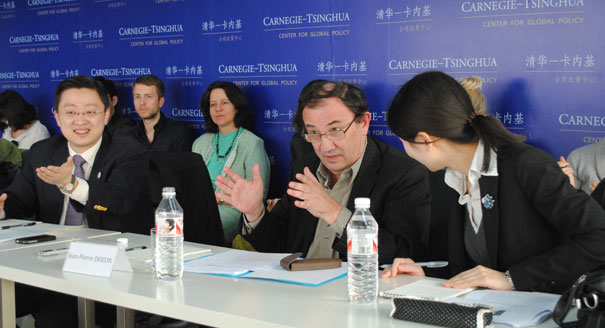Registration
You will receive an email confirming your registration.
IMGXYZ4491IMGZYXChina has supplanted the United States as Africa’s largest trade partner and now claims significant investments in Francophone Africa. This increased trade, particularly in natural resources, means China has come into contact with numerous African governments, companies, and local populations. Such contacts have brought about diverse public perceptions of China in Francophone Africa.
The Carnegie-Tsinghua Center for Global Policy hosted a discussion of the nature of China’s relations with Africa with Jean-Pierre Dozon, a professor at the School for Advanced Studies in the Social Sciences in Paris, Cai Hua, a professor at Peking University, Sun Xiaomeng, a professor at Beijing Foreign Studies University, Wang Kun, a professor at Beijing Foreign Studies University, Ou Haiyang, a professor at Tsinghua University, and Mao Xiaoqing, an official at the Chinese Ministry of Commerce. Carnegie-Tsinghua’s Zhang Chuanjie moderated.
History of Francophone Africa
France’s engagement with Africa created profound and extensive changes within the continent. Its influence, Dozon explained, was markedly different than that of the British, who were the other major colonial presence in Africa.
- Historical Context: Dozon charted relations between France and Africa beginning in the nineteenth century when France colonized some regions of Central and West Africa. During World War II, former French president Charles de Gaulle intensified France’s control over Africa and incorporated Africa into its policymaking decisions. After 1960, although some African countries gained independence, France’s Fifth Republic maintained close relations with those African countries.
- Felix Houphouet-Boigny and Francophone Africa: Dozon explained that, from the 1960s to 1980s, French immigration to African countries increased, resulting in the concept of a “Francophone Africa.” At the time, population, capital, and business in Francophone Africa were French-dominated. Politically, many state leaders of Africa, notably Felix Houphouet-Boigny, former president of the Ivory Coast, gave their support to the establishment of such a system.
- Francophone Africa versus Anglo Africa: Sun argued that Britain exercised indirect rule over its colonies while France maintained direct rule. With regard to its linguistic imprint, France’s public diplomacy served as an essential element in creating Francophone Africa. In Anglo Africa, the masses speak their native languages while only the elite speak English, he concluded.
Francophone Africa Today
France’s footprint in Africa has been steadily declining, with the notable exception of its Mali intervention, participants stated.
- Decline of Francophone Africa System: Dozon remarked that the death of the Ivory Coast’s first president in 1993 was a seminal moment in the decline of the Francophone African system. Today, only large private companies and interest groups gain real benefit from French presence in Africa.
- French Intervention in Mali: Dozon stated that France’s military intervention in Mali was a positive intervention intended to help Mali rebuild—almost the entire international community agreed with France’s actions. He added that even China and Russia gave their support to France, which stands in marked contrast to their traditional attitudes.
China-Francophone Africa Relations
Zhang noted that Chinese President Xi Jinping’s visits to three African countries were a sign of Africa’s increasing importance in Beijing’s foreign policy.
- Sino-African Cooperation: Chairman Mao Zedong stated that China’s aid to Africa started in Egypt in 1956, explained Zhang. Since then, after its own reform and opening up, China began to undertake projects in Africa and trade relations gradually developed. The establishment of the Forum on China-Africa Cooperation in 2000 has greatly improved China’s relationships with African countries and Africa has surpassed Asia to become China’s largest aid destination, Zhang said.
- Future of China and Francophone Africa: Both Dozon and Wang noted that France’s military projection into Francophone Africa is diminishing, and they questioned whether any future intervention such as in Mali would be within France’s capabilities. At the same time, they added, China is developing its economic activities and political relations with African nations and could provide alternative resources for the region.
Cai Hua, Sun Xiaomeng, Wang Kun, Ou Haiyang, Mao Xiaoqing
